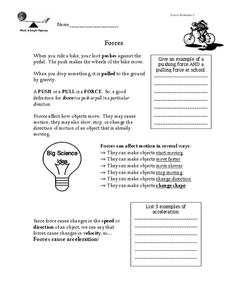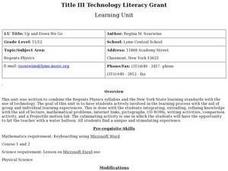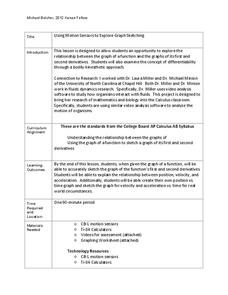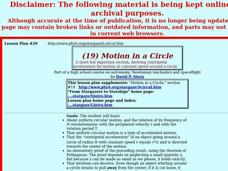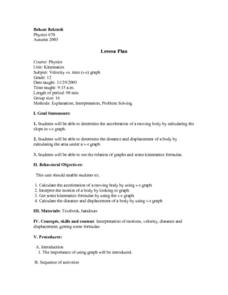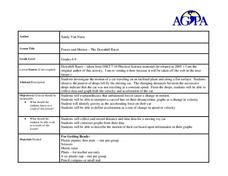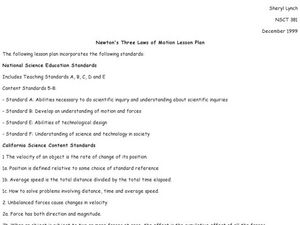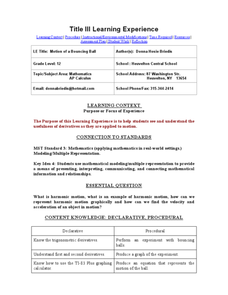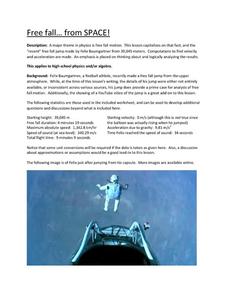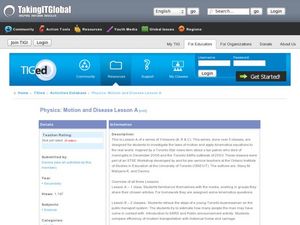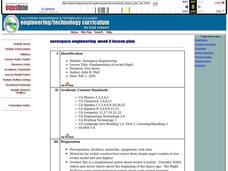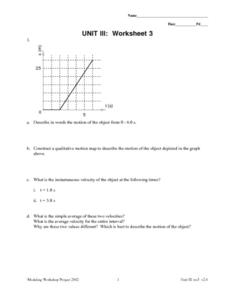Curated OER
Graphing Your Motion
Seventh graders investigate velocity and speed. In this Vernier Probe instructional activity, 7th graders will use probes to calculate motion, speed, and velocity of an object. They will create a graph of their collected data.
Curated OER
Forces
In this forces worksheet, learners read about force and acceleration. They complete a Venn Diagram to compare and contrast balanced and unbalanced forces, they answer questions about a diagram of a tug-a-war and the forces acting on each...
Curated OER
Up and Down We Go
Students explore physics concepts such as velocity, acceleration and speed to create a model of a safe roller coaster. They design and conduct a lab to demonstrate the properties of an object fired horizontally and at an angle.
Kenan Fellows
Using Motion Sensors to Explore Graph Sketching
Get moving to a better understanding of graphs of derivatives. Using motion sensors, scholars vary their velocities to create graphs of the first derivative of a function. The activity challenges groups to first create a script of the...
Curated OER
MOTION IN A CIRCLE
Students explore uniform circular motion, and the relation of its frequency of N revolutions/sec with the peripheral velocity v and with the rotation period T, and the "centripetal acceleration" of an object.
Curated OER
Elevator Height as Integral of Velocity
Pupils investigate integrals and their relationship to velocity in this calculus lesson. They use the idea of a moving elevator to explore vertical motion and use the TI to help them create a visual.
Curated OER
Weight and Velocity
Students perform an experiment in order to determine how increasing weight affects the velocity of a truck and use the computer to compile their data.
Curated OER
Velocity vs. Time
Twelfth graders read and interpret v-t graphs. After studying velocity and time, 12th graders read graphs to calculate the acceleration of a moving body and determine the distance and displacement of a body. Students explore the...
Curated OER
Circular Motion: Target Practice
Students demonstrate direction of velocity of an object in circular motion. They discuss the mathematical formula, and demonstrate the formula using a string, rubber stopper and a target.
Curated OER
Forces and Motion-The Downhill Racer
Students calculate a toy car's velocity and acceleration. In this force and motion lesson, students build ramps and attach a dropper to a toy car, which is released down the ramp. Students calculate and graph velocity and acceleration...
Curated OER
Straight Line Motion with a Stomper
Pupils explore average speed, and graph distances and time. In this speed and velocity lesson students complete a lab then calculate distances, acceleration and velocity and graph the data.
Curated OER
Newton's Three Laws of Motion Lesson Plan
Students explore Newton's three laws of motion using a variety of activities. In this physics lesson, students calculate the average speed of a vehicle they constructed using distance and time information. They identify and draw the...
Curated OER
Motion of a Bouncing Ball
Twelfth graders complete a unit of lessons on derivatives as they are applied to motion. They observe and discuss demonstrations, conduct an experiment involving a motion sensor, graph and analyze the results, and summarize their findings.
Curated OER
Position vs. Time and Velocity vs. Time Graphs
In this constant velocity worksheet, students use data of position vs. time of a roller-skater to determine speed, acceleration, or deceleration at different points along the path. Students rank graphs according to average velocity and...
University of Wyoming
Free Fall…From SPACE!/Nanotechnology in the Classroom
Provide the details about Felix Baumgartner's sky jump from the far reaches of our atmosphere, 39,045 meters up! Then get your physics free fallers to evaluate the factors that played a role in his acceleration, the time to reach maximum...
Curated OER
Vector Investigation: Car Storm Chaser
Students investigate the relationship between vectors and motion. For this geometry lesson, students create a system that exemplifies the principles of motion. They solve for the acceleration, velocity and displacement.
Curated OER
Vectors: Follow That Arrow
Vectors and their connection to motion. A video will be presented to provide information for the class to use methods of solving vectors with and without grids. Real-world physical concepts will be explored in reference to vectors.
Curated OER
Acceleration, Drag, Gravity, Motion, Forces, and Friction
Eighth graders build and run mousetrap cars in order to measure distance, time, and mass for their cars. They use these measurements to calculate average speed and kinetic energy, then create a slide show to visually explain how the car...
Curated OER
Pendulum Motion
Students explore questions which cannot be handled with simple pendulums, and examine both the usefulness and the limitations of approximations in science. A Java applet created from a Stella model is included.
Curated OER
Speedy Spaghetti
Middle schoolers explore the principles of motion by constructing a car out of pasta that will carry a large marshmallow and travel down a ramp. They discuss the formula for calculating speed, design and build their cars, and calculate...
Curated OER
PROJECTILE MOTION
Students measure muzzle velocity, and predict range of a projectile device. In this motion lesson students complete a lab and explain the outcomes of their experiments.
Curated OER
Physics: Motion and Disease
Students read media and identify examples of science technology and society. In this physics lesson, students learn about acceleration and velocity. Students estimate how many people would have come in contact with a person who...
Curated OER
Aerospace Engineering
Twelfth graders examine the physics of rocket flight. They build and launch model rockets to measure their performances.
Curated OER
Unit III: 3
In this unit III: 3 worksheet, learners describe motion in words and graph drawings. Students calculate the instantaneous velocity and average velocity. Learners also graph the displacement of the object in the word problems.



